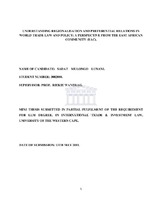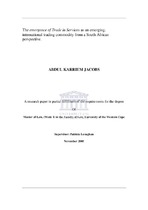REGULATING SMALL CROSS BORDER TRADERS AS A SOLUTION TO INCREASE INTRA AFRICAN TRADE: IMPLICATIONS OF THE AFRICAN CONTINENTAL FREE TRADE AREA
Abstract
Background: In January 2012, fifty-four African countries agreed to establish the African Continental Free Trade Area (AfCFTA) during the 18th Ordinary session of the assembly of heads of state and government of the African Union (AU) held in Addis Ababa, Ethiopia. The formation of AfCFTA dates back to July 1991 when the then Organisation of African Unity (OAU) member countries adopted the Abuja Treaty that set the creation of Free Trade Areas (FTAs) in each region as the first step towards the creation of an African Economic Community (AEC) by 2028, followed by customs unions, common markets and monetary unions.The agreement establishing the AfCFTA was signed by the AU heads of state and government in Kigali, Rwanda on 21 March 2018,3 as one of the flagship projects of the AU Agenda 2063.
The AfCFTA entered into force on 30th May 2019 after 24 Member states deposited their instruments of ratification. The AfCFTA marks the start of a new era for mega-regional trade relations on the African continent and enhanced efforts at deepening trade and regional integration. Amongst other objectives, the AfCFTA aims to create a single market for goods and services, facilitate the movement of persons, remove Non-Tariff Barriers and tariff to trade and promote industrial development and inclusive socio-economic growth on the continent in order to boost intra-African trade
Collections
Related items
Showing items related by title, author, creator and subject.
-
Understanding regionalisation and preferential relations in world trade law and policy: a perspective from the East African Community (EAC).
Lunani, Sadat Mulongo (University of the Western Cape, 2011)The rapid growth in the number of regional trade agreements (RTAs) has led to concern about the weakening of the multilateral trading system. This thesis examines the spread of such agreement and the extent to which they ... -
Enhancing the capacity of policy-makers to mainstream gender in trade policy and make trade responsive to women's needs: A South African perspective
Nkuepo, Henri J. (University of the Western Cape, 2010)The impact of trade policies on the pursuit of gender equality is often ignored. Recognising the link between trade and gender, this dissertation aims to enhance the capacity of policy-makers to mainstream gender in trade ... -
The emergence of trade in services as an emerging, international trading commodity from a South African perspective
Jacobs, Abdul Karriem (University of the Western Cape, 2005)The reason for highlighting the difference between GATT and GATS is to focus on the impact of these agreements on the developing countries and in particular the latter will be the main focus of this paper. The economies ...



